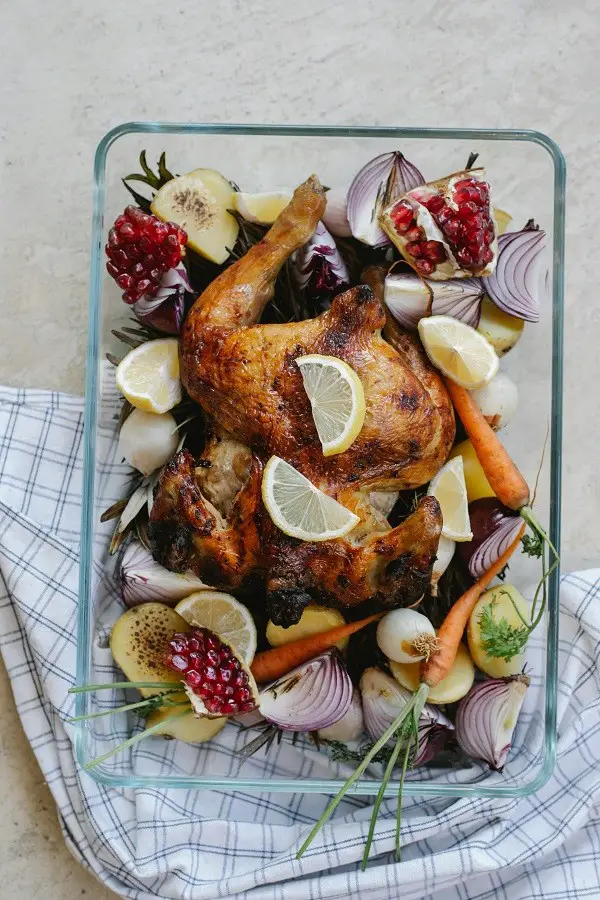Last Updated on January 6, 2025
Yes, you can eat duck while pregnant. Duck is a safe and nutritious option for pregnant women and can be enjoyed as part of a balanced diet.
Duck is a versatile and flavorful protein source that can provide essential nutrients during pregnancy. It is packed with high-quality protein, vitamins such as niacin and riboflavin, and minerals like iron and selenium. Iron is especially important during pregnancy to support healthy blood production and prevent anemia, while selenium plays a crucial role in maintaining a healthy immune system.
When consuming duck or any other type of meat during pregnancy, it is important to ensure that it is cooked thoroughly to eliminate the risk of foodborne illnesses. Additionally, pregnant women should consult with their healthcare provider to discuss their specific dietary needs and guidelines.

Potential Risks And Benefits
Discover the potential risks and benefits of consuming duck during pregnancy. From improved iron intake to a higher risk of bacterial infections, understanding the pros and cons is vital for making informed dietary choices.
Is It Safe To Consume Duck During Pregnancy?
Duck is a delicious and popular dish enjoyed by many, but is it safe for pregnant women to indulge in during their nine-month journey? This section will explore the potential risks and benefits of eating duck while pregnant, helping you make an informed decision about including this flavorful fowl in your diet.
Nutritional Benefits Of Duck For Pregnant Women:
Eating a well-balanced and nutrient-rich diet is essential for the health of both mom and baby during pregnancy. Here are some nutritional benefits that duck can offer:
- High protein content: Duck is a rich source of protein, which is crucial for the development of your baby’s organs, muscles, and tissues.
- Iron source: Iron is vital during pregnancy to support the production of red blood cells and prevent anemia. Duck is a good source of this essential mineral.
- B vitamins: Duck contains B vitamins like niacin, riboflavin, and vitamin B12, which play a key role in energy production and the healthy functioning of the nervous system.
- Omega-3 fatty acids: These healthy fats promote the development of the baby’s brain and eyes. Duck, particularly wild varieties, can provide a good amount of omega-3 fatty acids.
Considerations For Cooking And Consuming Duck While Pregnant:
While duck offers several nutritional benefits, it’s important to keep some considerations in mind when it comes to cooking and consuming it during pregnancy:
- Safety measures: Ensure that duck is cooked at the appropriate temperature (165°F or 74°C), as undercooked poultry can harbor harmful bacteria such as salmonella. Proper cooking eliminates these risks.
- High-fat content: Duck is known for its high-fat content, which can contribute to excess calorie intake. Moderation is key, so enjoy it as part of a balanced diet while keeping tabs on overall fat consumption.
Remember, it’s always advisable to consult with your healthcare provider or a registered dietitian before making any dietary changes during pregnancy. They can provide personalized guidance based on your specific needs and overall health.
So, if you’re craving a savory duck dish while expecting, just make sure it’s cooked thoroughly and enjoyed in moderation. With the potential nutritional benefits it offers, you can savor the flavors without any unnecessary concerns.
Guidelines For Safe Consumption
Are you wondering if it’s safe to eat duck while pregnant? Here are some guidelines to consider to ensure a safe and healthy pregnancy.
The Importance Of Food Safety During Pregnancy
Pregnancy is a crucial time when the health of both the mother and the developing baby should be given utmost priority. Food safety plays a vital role in ensuring a healthy pregnancy. When it comes to consuming duck meat during pregnancy, certain guidelines need to be followed to ensure safe consumption.
This section will provide you with essential information on recommended cooking temperatures for duck and how to avoid potential contaminants or toxins in duck meat.
Recommended Cooking Temperatures For Duck
Cooking temperatures play a significant role in eliminating harmful bacteria that may be present in raw duck meat. To ensure that the duck is cooked thoroughly and safe for consumption during pregnancy, it is essential to follow these recommended cooking temperatures:
- Internal Cooking Temperature: Cook duck meat until it reaches an internal temperature of 165°F (74°C) to ensure that it is fully cooked and safe to eat.
- Use a Food Thermometer: To accurately measure the internal temperature of the duck meat, it is recommended to use a food thermometer. Insert the thermometer into the thickest part of the meat, avoiding bones, to get an accurate reading.

Avoiding Potential Contaminants Or Toxins In Duck Meat
While duck can be a nutritious and delicious protein option during pregnancy, it is essential to be cautious about potential contaminants or toxins that may be present in the meat. Here are some guidelines to follow to ensure safe consumption:
- Choose High-Quality Sources: Purchase duck meat from trustworthy sources, such as reputable butchers or grocery stores, to ensure its quality and safety.
- Freshness: Check the freshness of the duck meat by looking for clear, odorless, and properly packaged products. Avoid meat with signs of discoloration or an unpleasant smell.
- Storage and Handling: Properly store and handle raw duck meat to prevent any cross-contamination. Keep it refrigerated at temperatures below 40°F (4°C) and separate from other foods, especially those that will be consumed raw.
- Cooking Precautions: Thoroughly cook the duck meat to kill any potential bacteria or parasites. Avoid consuming raw or undercooked duck meat during pregnancy.
- Seasonings and Marinades: Be cautious when using seasonings or marinades that may contain raw or partially cooked ingredients. Ensure that all ingredients are cooked thoroughly before using them on duck meat.
By following these guidelines for the safe consumption of duck meat during pregnancy, you can enjoy this protein-packed food while ensuring the health and well-being of both you and your baby. Remember to always prioritize food safety and make informed choices when it comes to your diet during pregnancy.
Alternative Options And Substitutions
Duck can be consumed during pregnancy, but it is important to cook it thoroughly to avoid any potential foodborne illnesses. However, if you prefer alternative options or substitutions, you can consider lean meats like chicken or turkey as a safe and healthy choice.
Duck is a popular protein choice for many people, but what about during pregnancy? If you’re wondering whether you can safely enjoy duck while pregnant, it’s important to consider alternative options and substitutions. Thankfully, there are plenty of delicious and nutritious alternatives to ducks that can offer the same satisfaction.
In this section, we’ll explore alternative protein sources for pregnant women and highlight some vegetarian and plant-based options. Additionally, we’ll discuss how to incorporate safe and nutritious substitutes into your pregnancy diet.
Exploring Alternative Protein Sources For Pregnant Women:
- Lean meats like chicken and turkey: These options are rich in protein and can be prepared in various ways to provide a tasty and healthy alternative to duck.
- Fish and seafood: Opt for low-mercury choices like salmon, shrimp, and trout, which are not only a great source of protein but also provide essential omega-3 fatty acids for your baby’s development.
- Legumes: Beans, lentils, and chickpeas are high in protein, fiber, and various nutrients, making them excellent alternatives to animal-based proteins.
- Eggs: A versatile protein source, eggs are packed with essential vitamins and minerals. They can be enjoyed in many dishes, from omelets to salads.
- Dairy products: Milk, yogurt, and cheese are rich in protein and calcium, which are important for your growing baby’s bones and muscles.
Vegetarian And Plant-Based Options As Alternatives To Duck:
- Tofu and tempeh: These soy-based products are excellent meat substitutes, offering a good amount of protein and versatility in cooking.
- Seitan: Made from wheat gluten, seitan is a chewy and protein-rich alternative that can be used in stir-fries, sandwiches, and other dishes.
- Quinoa: Not only is quinoa a complete protein source but it’s also packed with fiber and other essential nutrients, making it an excellent choice for vegetarians and vegans.
- Nuts and seeds: Almonds, walnuts, chia seeds, and hemp seeds provide satisfying protein, healthy fats, and other vital nutrients.
- Vegetables: Broccoli, spinach, kale, and other leafy greens are not only packed with vitamins and minerals but also offer a decent amount of plant-based protein.
Incorporating safe and nutritious substitutes in your pregnancy diet:
- Consult with your healthcare provider: Before making any significant changes to your diet, it’s essential to speak with your doctor or a registered dietitian to ensure you’re meeting your nutritional needs during pregnancy.
- Balance your meals: Aim for a variety of protein sources throughout the day to ensure you’re getting all the essential amino acids. Combine grains, legumes, or vegetables to create balanced and satisfying meals.
- Experiment with different recipes: Explore new recipes that focus on plant-based proteins or alternative meats. This allows you to discover new flavors and ensures you’re not missing out on delicious meals during your pregnancy.
- Keep safety in mind: Make sure to cook all proteins thoroughly to eliminate any potential risks of foodborne illnesses. Follow the recommended cooking guidelines for each protein source.
- Stay mindful of your nutritional needs: While substituting duck for alternative protein sources, be mindful of other essential nutrients such as iron, folate, and vitamin B12 that play a crucial role in your baby’s development.
Now that you have a better understanding of the alternative options and substitutions available during pregnancy, you can confidently make choices that are not only safe but also provide the necessary protein and nutrients for you and your baby. Remember, variety is key, so continue to explore different alternatives to duck and enjoy a wholesome and balanced pregnancy diet.
Frequently Asked Questions
Can I Eat Duck Meat During Pregnancy?
Yes, you can eat duck meat during pregnancy. It is safe and provides essential nutrients.
What Meat Can You Not Eat While Pregnant?
Avoid eating raw or undercooked meat while pregnant to prevent foodborne illnesses.
How To Cook Duck Breast When Pregnant?
To cook duck breast while pregnant, ensure it reaches a minimum internal temperature of 165°F.
Is It Ok To Eat Duck Meat?
Yes, it is perfectly fine to eat duck meat.
Can Pregnant Women Eat Duck?
Yes, pregnant women can safely consume duck as long as it is cooked thoroughly.
Conclusion
Duck can be a safe and nutritious choice for pregnant women, as long as it is cooked properly and consumed in moderation. It is a good source of protein, vitamins, and minerals that are essential for the healthy development of the baby.
However, it is important to ensure that the duck is thoroughly cooked to avoid any potential risks of foodborne illnesses. Pregnant women should also be mindful of any existing allergies or dietary restrictions they may have. Consulting with a healthcare professional is always recommended to ensure that eating duck fits within an individual’s specific health needs during pregnancy.
By making informed choices and incorporating a variety of foods, including duck, into a balanced diet, pregnant women can enjoy a delicious and nourishing culinary experience while prioritizing the well-being of themselves and their babies.











